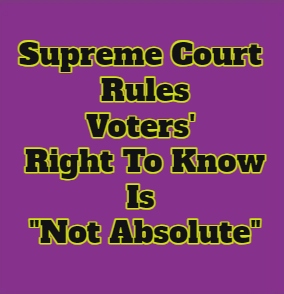

By Our Editorial Team
First publised on 2024-04-11 14:49:42
Are voters
entitled to know each and every financial and personal detail of politicians
who stand for election? Earlier, there were no norms for disclosure. Later,
after a tough fight, a law was put in place whereby those who submitted their
candidature were to submit an affidavit of assets and court cases pending
against them in order to ascertain their wealth and the extent to which they
were accused in criminal cases. The affidavits were instrumental in allowing
the public to know how much additional wealth the politician had accumulated
after becoming a people's representative (when he or she filed the affidavit in
the next election) and that in turn was expected to allow them to ascertain
whether the person had made it by corrupt means as a people's representative.
It was hoped that it would lead to more informed voting decisions on part of
citizens. But very soon, other politicians and the media started digging deeper
and laid bare the entire personal history of politicians, including things
which were of no concern of the public.
The Supreme
Court has now sought to put the brakes on such uninhibited intrusion on the
privacy of politicians. In overturning the Gauhati HC judgment in the case of
Arunachal's Independent MLA Karikho Kri (whose election to the Arunachal
assembly in 2019 was declared invalid as he had 'forgotten' to mention he owned
three vehicles in his asset affidavit), the Supreme Court has made some strong
statements against the citizens' right to know balanced with the privacy of
politicians. It said that citizens' right to know was "not absolute" and politicians' right to privacy meant they need not disclose "matters of no concern to voters or
irrelevant to his candidature for public office."
What the
Supreme Court said widened the scope of the matter but in the instant case, the
apex court applied the proportionality test. The vehicles which Kri had 'forgotten' to declare were a scooty, a motorbike and a van. The court said that the asset
affidavit could be treated defective if the non-disclosure was a sizeable
percentage of the total assets declared. In Kri's case it was not and hence his
election could not be invalidated. If a line is not drawn somewhere, elections
will be invalidated for trivial reasons and that would be against democratic
norms.











